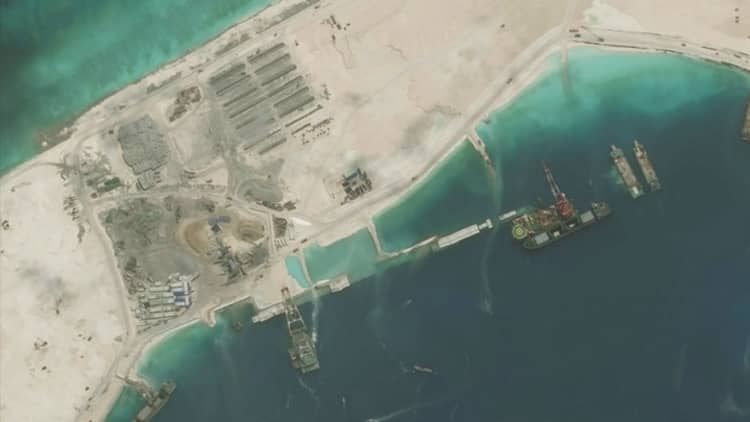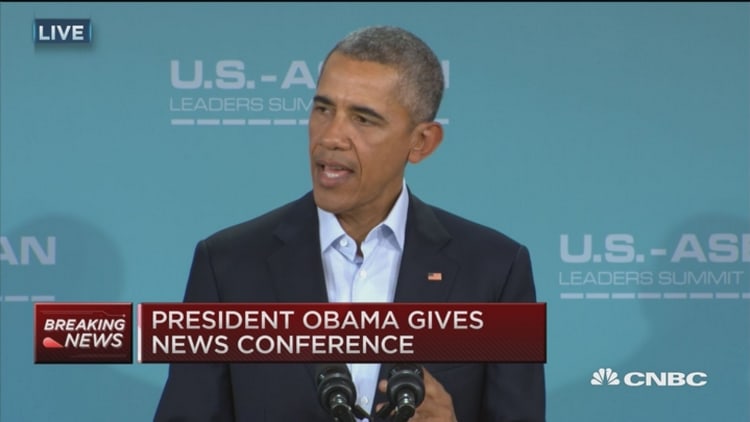
China has deployed an advanced surface-to-air missile system to one of the disputed islands it controls in the South China Sea, Taiwan and U.S. officials said, ratcheting up tensions even as U.S. President Barack Obama urged restraint in the region.
Taiwan defense ministry spokesman Major General David Lo told Reuters the missile batteries had been set up on Woody Island. The island is part of the Paracels chain, under Chinese control for more than 40 years but also claimed by Taiwan and Vietnam.
"Interested parties should work together to maintain peace and stability in the South China Sea region and refrain from taking any unilateral measures that would increase tensions," Lo said on Wednesday.
A U.S. defense official also confirmed the "apparent deployment" of the missiles, first reported by Fox News.
Images from civilian satellite company ImageSat International show two batteries of eight surface-to-air missile launchers as well as a radar system, according to Fox News.
News of the missile deployment came as Obama and leaders of the Association of Southeast Asian Nations (ASEAN) concluded a summit in California, where they discussed the need to ease tensions in the region but did not include specific mention of China's assertive pursuit of its claims in the South China Sea.
China claims most of the South China Sea, through which more than $5 trillion in global trade passes every year, and has been building runways and other infrastructure on artificial islands to bolster its territorial claims. Vietnam, Malaysia, Brunei, the Philippines and Taiwan have rival claims on the area.
At the end of the ASEAN summit in Washington D.C. on Tuesday, President Barack Obama reaffirmed the United States' "strong commitment to a regional order where international rules, norms, and the rights of all nations --large and small-- are upheld."
He said that countries at the summit discussed the need to take "tangible steps in the South China Sea to lower tensions, including a halt to further reclamation, construction and militarization of the disputed areas."
"I reiterate that the United States will continue to fly, sail and operate wherever international law allows, and we will support the right of all countries to do the same," Obama said.
The United States has said that it will continue conducting "freedom of navigation patrols" by ships and aircraft through the South China Sea. China has repeatedly called these patrols, which encroach on waters China claims ownership of, provocative and warned that they risked military action in response.
Ernest Bower, senior adviser and Sumitro Chair for Southeast Asia studies at the Center for Strategic and International Studies (CSIS), told CNBC that the U.S. was not asking ASEAN to choose between it and China, but rather to "strengthen themselves and become a solid core for new regional security and economic architecture."
"The genius of ASEAN is it doesn't have a sovereign identity and because of that, it doesn't have a sort of national interest like the U.S. or China does," Bower said.
But in a sign of the sensitivity over the issue, on Tuesday China rapped Australian Foreign Minister Julie Bishop for saying that Australia recognised the Philippines' right to seek international arbitration in its dispute with Beijing over islands in the South China Sea.
The Philippines has challenged Beijing's rights to the islands in an arbitration court in the Hague. Bishop had said that Australia did not take a side in the competing claims but was awaiting the arbitration outcome.
But Chinese Foreign Ministry spokesman Hong Lei repeated China's claim that the case was a contravention of international law. "China certainly will not accept this. Australia out not to selectively avoid this reality," he said.
The issue is further complicated by the fact that some ASEAN members, such as current chair of the group Laos and neighbor Cambodia, have close economic ties to China.
Rising tensions
Mira Rapp-Hooper, a South China Sea expert from of the Center for a New American Security, said, meanwhile, that it was not the first time that China has sent such weapons to the Paracels, under Chinese control since 1974.
"I do think surface to air missiles are a considerable development," she said. "If they have been deployed they are probably China's effort to signal a response to freedom-of navigation operations, but I don't think it is a totally unprecedented deployment."
A U.S. Navy destroyer sailed within 12 nautical miles of Triton Island in the Paracels chain last month in a move the Pentagon said was aimed at countering efforts by China, Vietnam and Taiwan to limit freedom of navigation. China condemned the U.S. action as provocative.
China has said it would not seek militarization of its South China Sea islands and reefs, but that did not mean it would not set up defenses.

"Woody Island belongs to China," said Ni Lexiong, a naval expert at the Shanghai University of Political Science and Law.
"Deploying surface-to-air missiles on our territory is completely within the scope of our sovereign rights. We have sovereignty there, so we can choose whether to militarize it."
Taiwan President-elect Tsai Ing-wen said tensions were now higher in the region.
"We urge all parties to work on the situation based on principles of peaceful solution and self-control," Tsai said.
The missiles arrived at Woody Island over the past week, Fox News said. According to the images, a beach on the island was empty on Feb. 3, but the missiles were visible by Feb. 14, it reported.
A U.S. official told Fox News the imagery viewed appears to show the HQ-9 air defense system, which has a range of 125 miles (200 km) and would pose a threat to any airplanes, civilian or military, flying close by.
Asked about the report, Bill Urban, a Pentagon spokesman, said: "While I cannot comment on matters related to intelligence, we do watch these matters very closely."




